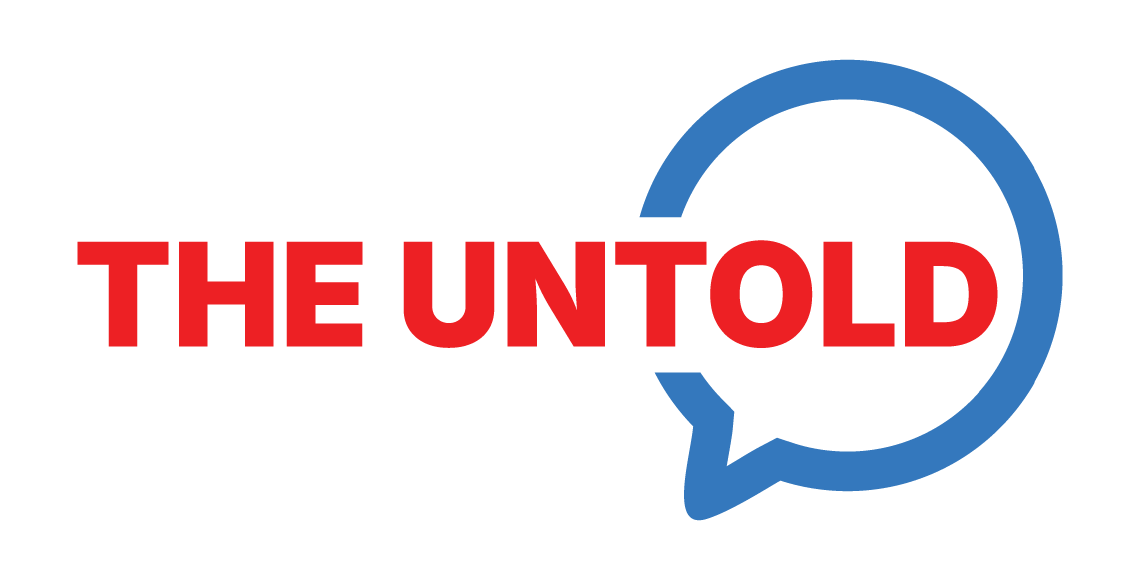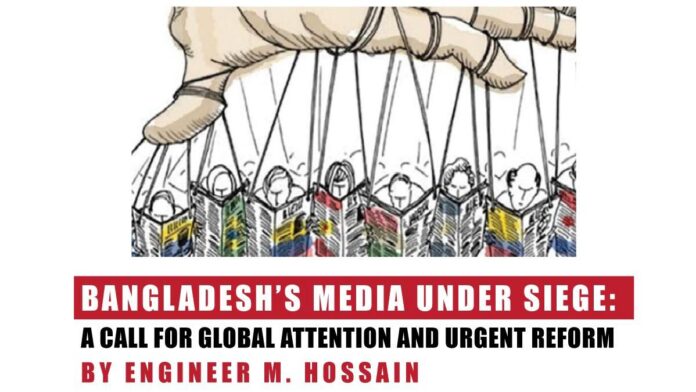Engineer M. Hossain:
The Universal Declaration of Human Rights, adopted in 1948, laid the foundation for global freedom and justice. Among its most critical principles is Article 19—the right to freedom of expression. Governments are not just encouraged but obligated to protect this right. Yet in Bangladesh today, that right is under siege.
Since the rise of the interim government led by Dr. Yunus, following the ousting of Sheikh Hasina in August 2024, Bangladesh has witnessed a dramatic erosion of press freedom. From mass firings and intimidation to violent attacks on journalists and media outlets, the situation has deteriorated into what many are calling a full-blown crisis. As of March 21, 2025, arrests, dismissals, and threats against those who dare to speak freely have only intensified. These developments demand immediate global attention.
A Pattern of Violence and Intimidation
Freedom of expression is being systematically violated, often with the backing—or at least the inaction—of state authorities. One example: on February 3 in Shariatpur, journalists were attacked in broad daylight. This isn’t an isolated case. Rather, it’s part of a growing pattern that reflects the government’s failure to uphold Article 39 of Bangladesh’s Constitution and its commitments under the International Covenant on Civil and Political Rights (ICCPR).
Legislative reform is no longer optional—it’s necessary. Repressive laws like the Cybersecurity Act (CSA) are being used to silence dissent. The arrest of writer Nahid Hasan under the CSA for allegedly hurting religious sentiments is just one example. While the government has signaled plans to repeal the CSA, proposed replacements appear equally threatening. Any new law must align with international standards and include the input of civil society.
Freedom of the Press Crumbles
The collapse of press freedom is well documented. The Office of the High Commissioner for Human Rights (OHCHR) released a Fact-Finding Report on February 12, 2025, highlighting severe human rights abuses during the protests in July and August 2024. One particularly violent episode occurred on July 18, when a mob stormed Bangladesh TV’s headquarters in Rampura. Police were overwhelmed and had to evacuate; the Border Guard Bangladesh (BGB) was deployed with orders to use force to regain control.
The violence didn’t end there. In the days following Sheikh Hasina’s departure, mobs vandalized and set fire to numerous TV stations. Ekattor TV was attacked twice—on August 3 and again on August 5. Other major channels—Somoy TV, ATN News, ATN Bangla, DBC News, My TV, Bijoy TV, and Gazi TV—also suffered damage, with journalists assaulted and offices ransacked.
On August 7, about 200 individuals, some armed and chanting pro-BNP slogans, stormed Mohona TV, assaulted staff, and demanded extortion money to avoid destruction of the station.
Censorship Through Accusation
Prominent journalists have faced accusations of murder and other violent crimes, casting serious doubt on the credibility of these charges. In response, the Interim Government Committee was formed in October to investigate journalist harassment. But on November 21, the Chief Advisor admitted that outdated methods were being used to expedite these cases, even as the government insisted they were legally filed.
The Editors’ Council raised the alarm in November 2024, highlighting increasing pressure on the media under Dr. Yunus’s government. Murder, harassment, and the revocation of press credentials for 49 journalists signaled a new wave of authoritarianism. Transparency International Bangladesh (TIB) also voiced concern over rising legal threats against journalists.
On November 5, the Editors’ Council condemned “mob justice” and criticized the growing hostility toward independent journalism. The Committee to Protect Journalists (CPJ) added that revoking press credentials for 29 Awami League-linked reporters was a dangerous form of political reprisal.
The pressure hasn’t eased. On February 21, 2025, a Jamaat leader threatened to vandalize Ekushey Television (ETV) unless a cameraman was fired. ETV reported the threat to the police, but the cameraman was still told his termination was necessary for the station’s survival.
Media Takeovers and Political Infiltration
Eight months after the political upheaval, the BNP, Jamaat, and NCP now hold major influence over the media. Staff are being laid off en masse. The government has not disclosed how many journalists have faced accusations or been dismissed. But a clear pattern has emerged: a wide-ranging political takeover of Bangladesh’s media landscape.
Government-owned BTV now operates under Mahbubul Alam, a journalist with ties to Jamaat. He has terminated all district representatives and dismissed key personnel. Bashundhara Group, the largest private media owner, is also playing a role in reshaping the media. On August 5, journalist Kader Goni Chowdhury—closely aligned with BNP leadership—became Deputy Managing Director of East-West Media Group. He immediately set his own salary and benefits and began firing journalists, including senior editors and special correspondents.
Ekattor TV’s CEO, Mozammel Haque Babu, sold part of the station to Meghna Group and resigned. New CEO Shafik Ahmed laid off nearly 40 employees and terminated most district and special representatives.
Similar purges are taking place across nearly every major news outlet:
• DBC News TV: Loton Ekram, with no TV experience, was made editor. He fired top editors and dismissed district correspondents.
• Ekushey TV: Harunur Rashid Swapan replaced the former chief and initiated a full overhaul.
• ATN News & Bangla, RTV, Mohona TV, Baishakhi TV, Independent TV, Desh TV, Samay TV, Gazi TV, and others have all seen changes in leadership and waves of dismissals.
• RTV’s new shareholder, a BNP leader, joined without any investment—an act of political patronage, not journalism.
• Green TV has been shut down entirely by the interim government.
Print Media Under Attack
Print journalism has fared no better. At Daily Kalerkontho, the editor was fired and replaced by a poet with no newsroom experience. Similar shakeups occurred at Bangladesh Pratidin, Daily Ittefaq, Jayjay Din, Jugantor, and others. In many cases, senior journalists were dismissed without cause.
The editor of Daily Bhorer Kagoj was imprisoned, leading to the newspaper’s closure—though it is now set to reopen. Meanwhile, political loyalists have gained control over respected dailies like Kalbela, and Islamic extremists are mobilizing against independent outlets like Prothom Alo and The Daily Star.
Online News in Peril
Online media platforms are also facing an existential threat. Editors and journalists at Banglanews24.com, Sarabangla.net, NTV Online, and others have been dismissed or pushed out. About 600 journalists have faced baseless allegations since August 5, while over 50 media offices have been attacked and 28 journalists detained.
Worse, 92 journalists have lost their press club memberships, leaving them vulnerable. The Bangladesh Financial Intelligence Unit (BFIU) is now investigating the finances of 96 journalists. Accreditation has been revoked for 168 reporters.
Fear, censorship, and political interference are now the norm.
Hope, But With Vigilance
Yet, amid this grim landscape, there is hope. Ordinary citizens are beginning to push back, voicing concerns over human rights violations. But hope alone isn’t enough—vigilance and accountability are essential. Every political party must be held responsible for their actions.
ARTICLE 19 has submitted recommendations to the Bangladesh Media Reform Commission, calling for urgent reforms. Despite a diverse media ecosystem, weak legal protections and political control are stifling journalism. The government must repeal laws that restrict press freedom, including the Code of Criminal Procedure, the Official Secrets Act, the Cybersecurity Act of 2023, and outdated telecom regulations.
New legislation should ensure safety for female journalists, fair wages, and protections against harassment and lawsuits. These reforms must align with Article 39 of the Constitution, which enshrines the right to a free press.
Bangladesh stands at a crossroads. If the interim government wishes to uphold democracy, it must protect journalism—not destroy it.

